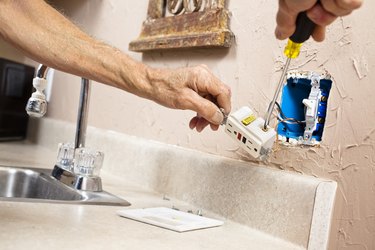Any small child is basically just curiosity with a propulsion system, and that curiosity often leads them into places that can be dangerous. One of those places is the bathroom. Ideally your tot would never be unsupervised in any room, but parents are only human and kids are great at finding opportunities to do some freelance exploring. Babyproofing your bathroom is a simple and practical way to reduce the risks they'll face as they learn to navigate the world.
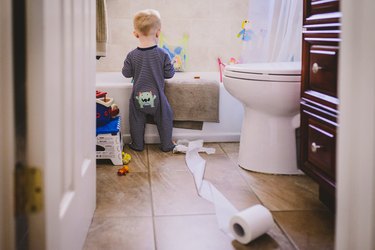
1. "Kid-Proof" the Door
The bathroom door is your first line of defense against inquisitive kid-dom, so that should always be your starting point. One option is to put a hook or sliding latch on the outside, up out of a toddler's reach but where an adult or older child can manage it easily. A second option is a doorknob guard, which goes over the knob itself and makes it all but impossible for little hands to turn. That may be a better option if you live in a rental and can't put holes in the door and its frame, or even if you simply don't want to cause permanent damage to solve a temporary problem.
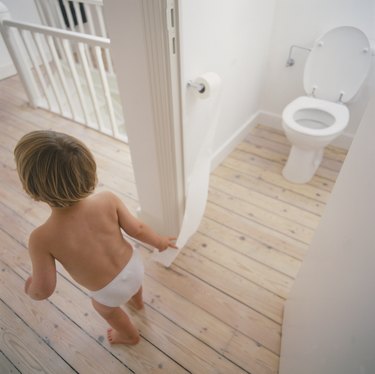
2. Get Hazardous Items out of Reach
Making sure your meds and cleaning products are up out of reach should be a no-brainer, but it's not quite as straightforward as you might think. For one thing, the position of your medicine cabinet might make it easy to climb for. In that case, you'll need to find another location for your products. Another consideration is that less-obvious items — hair products, bath beads, toothpaste — can make your child very ill if swallowed. Mouthwash often contains enough alcohol to be dangerous. Then there's the issue of sharp or swallowable items including nail scissors or clippers, tweezers, and any jewelry you take off before bathing or showering.
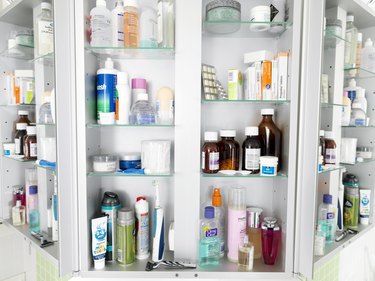
3. Tot-Proof the Toilet
The toilet is just about the last place in the house you want your small child playing (aside from perhaps a hot stove) and of course, it's one of the most tempting. They grasp intuitively that it's an important part of home life, and any toddler-height pool of splashable water would be a magnet for them in any case. This is problematic, and not just because of germs. A child leaning too far into the bowl could overbalance and drown, and a plummeting toilet seat could concuss a child or break small fingers. Toilet-lid anchors are inexpensive and effective, and installing a seat with a soft-close hinge can help prevent breaks and bruises.
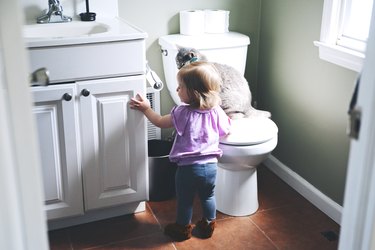
4. Tweak That Tub
Tub time can be some of the best fun the week has to offer for a lively tot, but it requires some fairly significant attention in order to be safe. First, move any shampoos, soaps and hair products up out of baby's reach. Put down a non-skid mat if the tub lacks a non-skid surface, and make sure the shower rod is well secured so it can't come down with a tug. The tub faucet is usually just the right height for a tiny head to make contact, so give it a padded cover. If you have the budget for it, you might also consider installing a "smart" digital faucet to manage water temperature. That way, there's little risk of scalding yourself or your little one.
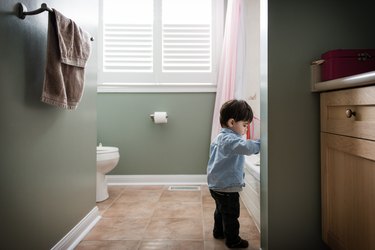
5. Check for Tipping Hazards
As with kitchens, there's no such thing as too much storage in a bathroom. Unfortunately that storage often comes in the form of standalone shelves and cupboards, tower units, or over-toilet hutches. Toddlers love to climb, and these tempting but dangerous pieces of furniture are likely to fall on your tot if they aren't secured. The government's AnchorIt.gov website provides a number of useful tips on how to kid-proof your appliances and furniture.
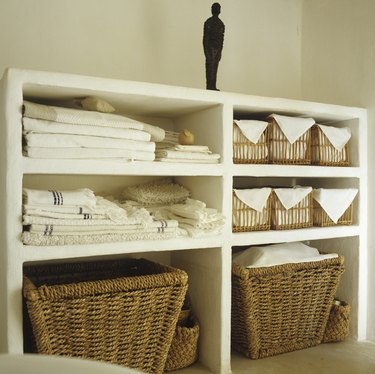
6. Deal With Slipping Hazards
Small children are already top-heavy and a bit unsteady on their feet, so slip prevention is just as crucial for them as it is for the elderly. Be diligent about cleaning up any slips, splashes or spills as soon as they happen. An absorbent non-slip bath mat, or maybe two, can also be very helpful. You can assume a few slips and stumbles might still happen, so if there are any sharp corners at toddler height, you can hedge your bets by applying padded corner protectors to save your little one's noggin from a nasty bump.
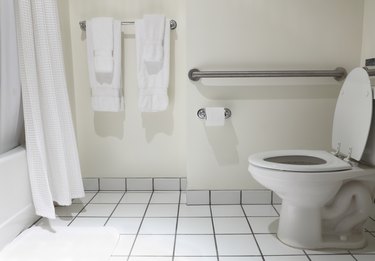
7. Take Away Temptation
Kids are natural climbers and explorers, so a big part of babyproofing is simply to remove or conceal any obvious temptations. A counter filled with cosmetics and hair-care products is a clear temptation, for example, so get them up into cupboards or shelving units. Cupboard doors should have child-resistant locks on them. If you keep a step stool on hand for your little one's supervised use, discourage unsupervised use by keeping it high enough that an adult must hand it down. The potty's a good step-stool as well, so keep it out of reach (or even outside of the bathroom) and bring it out with great ceremony when the time comes. That's not just good babyproofing strategy, it's good potty-training strategy as well.
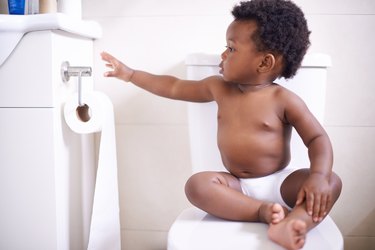
8. Don't Overlook the Trash
Moving hazardous items out of your toddler's reach is meaningless if you don't also take steps to secure your bathroom's trash. It's filled with exactly the kind of things — razor blades, used sanitary products, almost-empty bottles from hair products or cleaning supplies — you'd most want to keep away from inquisitive little fingers and mouths. One option is to place it in a cupboard with a child-proof lock, if your bathroom's layout permits that. You might also move it out of the bathroom to a nearby closet, which can be protected by a knob cover. In some homes, your best bet might be a trash can with a sliding child lock built right into the lid. Unlocking it is a mild inconvenience, but that's a small price to pay for safety.

9. Tackle Dirt, Germs and Allergens
Some of the less obvious hazards your little one will face in the bathroom include dirt, allergens and the inevitable, invisible coating of germs over everything. Frequent cleaning is the name of the game here, however tired you may be from just everyday parenting. Aside from routine cleanliness, keep a vigilant eye out for mold and mildew (especially on the shower curtain, which can be easily reached and chewed). It's also a great idea to keep the toilet brush and plunger in a locked cupboard, away from curious little hands and faces. One important note: Research suggests that early exposure to cleaning products may cause asthma, so consider DIY non-toxic cleansers.
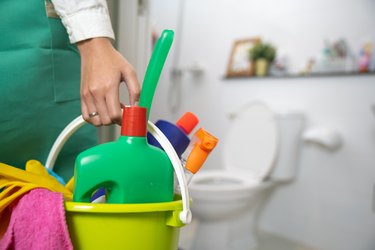
10. Amp Up the Electrical Safety
Keeping curious little fingers (and tongues) out of the electrical outlets is an essential babyproofing step in any room, and the bathroom is no exception. Inexpensive plug covers will serve for outlets that aren't in use. For spots where you need to leave something plugged in, you can purchase locking covers that mount to your wall plate. In general terms, when you aren't using curling irons and blow dryers they should be unplugged and out of reach. Also, your bathroom outlets should be the ground fault circuit interrupter (GFCI) type, so if your tyke manages to drop an electrical item into a sink full of water the result won't be a potentially lethal shock.
